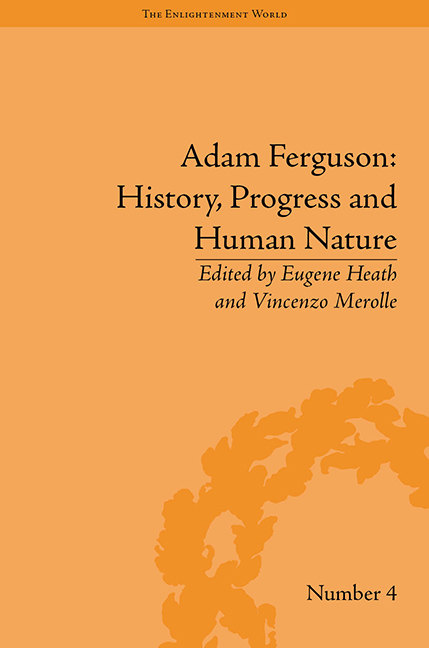Book contents
- Frontmatter
- CONTENTS
- Contributors
- Introduction
- I Life and Works
- II In History
- 4 Ferguson's Reflections Previous to the Establishment of a Militia
- 5 Ferguson's Views on the American and French Revolutions
- 6 Political Education for Empire and Revolution
- III On History
- IV Human Nature, Action and Progress
- Notes
- Works Cited
- Index
6 - Political Education for Empire and Revolution
from II - In History
- Frontmatter
- CONTENTS
- Contributors
- Introduction
- I Life and Works
- II In History
- 4 Ferguson's Reflections Previous to the Establishment of a Militia
- 5 Ferguson's Views on the American and French Revolutions
- 6 Political Education for Empire and Revolution
- III On History
- IV Human Nature, Action and Progress
- Notes
- Works Cited
- Index
Summary
Adam Ferguson is a disappointment to many of his commentators because he fails to develop the intriguing promise of An Essay on the History of Civil Society, as a dissent from the brilliant complacency about commercial society in the writings of David Hume and Adam Smith. His subsequent publications appear in contrast to be mere textbooks of conventional wisdom and aimed above all, to take up a theme from George Davie, at mending rifts in the formerly prevailing, unreflected philosophy of civilization which were caused by various audacious explorations of its grounds, notably by David Hume. On such an interpretation, Ferguson appears as a mere pedagogical pendant to Thomas Reid.
This has never been my view. My own intermittent encounters with Ferguson's writings, although they originated in a long-forgotten hope of clarifying a theoretical moment in the prehistory of Marxism, have featured a series of proposals for finding an interpretative frame of reference able to comprehend the entire composite ‘document’ presented by the records of Ferguson's career. If philosophy is taken seriously as a distinctive kind of structure of knowledge, it follows that we have to find ways of characterizing different kinds as well. Michael Freeden's concept of ‘political ideology’ is an influential current example. The way stations on the route of my travels with Ferguson are marked by concepts such as Karl Mannheim's ‘style of thought of intellectuals’, Sigurd Burckhardt's ‘complementarity’ and Kenneth Burke's ‘constitution’.5 In each of these settings, or so I argued, the conjunction of Ferguson's forcefully stated reservations about commercial society and the cautious explication of his eclectic constructive model of moral theory could be explored and understood, thereby securing an appropriate assessment of Ferguson's work.
The present fragmentary exercise is less ambitious. The idea is simply to interrogate some illustrative texts derived from the lecture notes of Ferguson's moral philosophy class, with attention to his revisions in the period 1775–85.
- Type
- Chapter
- Information
- Adam FergusonHistory, Progress and Human Nature, pp. 87 - 114Publisher: Pickering & ChattoFirst published in: 2014



